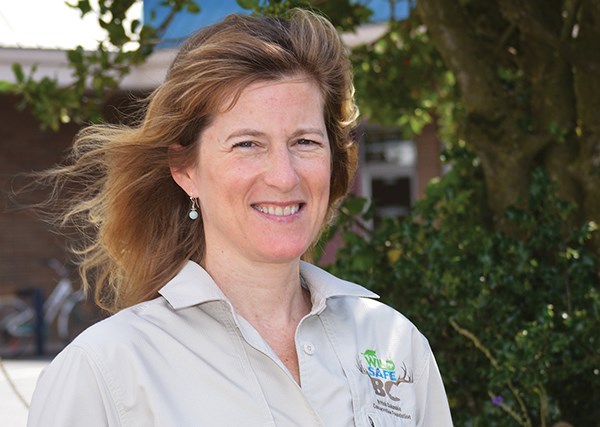Take note Squamish: she’s back, and the bears are still out.
Meg Toom is back in her former role as Squamish’s WildSafe С����Ƶ community coordinator, a position she left in 2015, after the recent departure of the previous coordinator, Vanessa Isnardy.
Toom moved to Vancouver Island for two years but recently returned to the Mainland.
“I kind of came to the conclusion it wasn’t quite where I wanted to be,” Toom said of living in a remote location on the west coast of the island. “Too far away from friends and family,” she explained.
Toom said living away from Squamish gave her a unique perspective on the district.
“Did it ever open my eyes to how spoiled I was living in a community that was so pro-active,” she said, adding on the island she had to bring her own locked garbage tote to keep wildlife out because the community didn’t have bear-resistant policies or infrastructure in place.
Now that she is back and in her former role, Toom is reminding Squamish residents that though it is winter, some bears are still out, and so it is important not to become complacent about removing bear attractants.
“[Bears] don’t hibernate because it is cold, they hibernate because their natural food is gone — there’s no more grasses, there’s no clover, there’s no berries,” she said.
“If there’s non-natural food and it packs a whack of calories — like garbage or a bird feeder — they will stick around.”
Securing garbage in locked totes and removing other attractants allows bears to follow their natural cycle, in other words.
Elk are also currently out in force, so it is essential to be on the lookout for them while driving the highway.
“Those animals are very large, upwards of 1,000 lbs for a bull… so it’s very important for human safety as well as the conservation of the elk,” she explained.
A local Roosevelt elk herd is known to populate the green spaces adjacent to the highway and it can attempt to cross the busy road to reach other green space, Toom explained.
Though hunted to extinction about a century ago, elk were re-introduced into the Squamish Valley in 2006 and into the Mamquam River Watershed in 2011, according to the District of Squamish.
(If elk are spotted close to Highway 99, call the Conservation Officer Service 24/7 hotline at 1-877-952-7277.)
Cougars don’t hibernate; they are active 12 months a year, so Toom said residents could expect to see them, along with spotting wolves and coyotes.
On Toom’s radar for the coming year is completing a review of the District’s bear conflict management plan that will be then be presented to representatives with the provincial Ministry of Environment to show the government Squamish is still worthy of its Bear Smart community designation.
The review should be wrapped up in the next few months, according to Toom.
Educating new residents about being Bear Smart is another goal for Toom.
The District of Squamish became the second community in С����Ƶ to receive Bear Smart Accreditation from the Ministry of Environment, on Sept. 25, 2010.
The accreditation means Squamish commits to reducing human-bear conflicts through education, collaboration, and innovation.
For more information on respecting local wildlife, go to .




